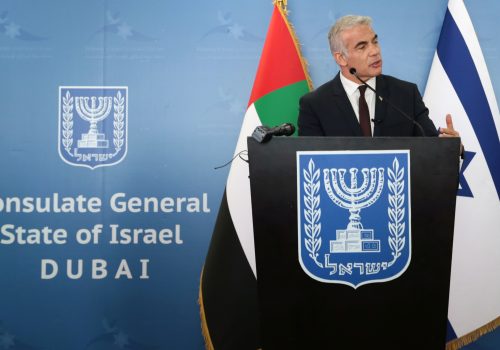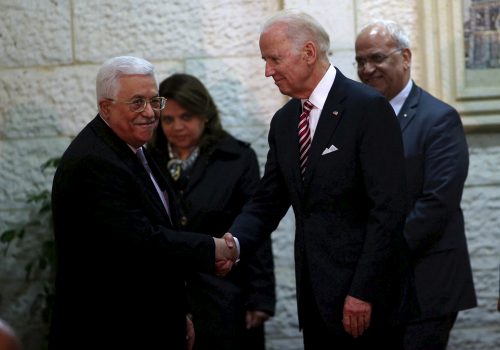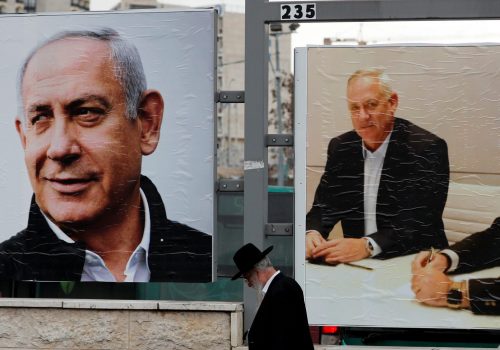Biden and Bennett turned the page on US-Israel ties. But not many were paying attention.
Israeli Prime Minister Naftali Bennett’s first visit to the White House on August 27 occurred just as President Joe Biden was absorbing the horror of the Kabul airport suicide bombing, lending poignancy to their efforts at resetting relations between the United States and its closest Middle East ally. It muffled potential points of conflict and allowed the Israeli leader to project goodwill and bipartisanship at a time when Biden was hurting.
Gone was the swagger of former President Donald Trump and Prime Minister Benjamin Netanyahu, who were confident that they could recast the rules of regional dealmaking and tell skeptics to get lost. In its place were a shaken 78-year-old Biden and sympathetic Bennett—almost thirty years his junior—looking to help each other. That meant disagreements on the Israeli-Palestinian peace track were swept under the Oval Office rug and dealt with in private out of fear that they might weaken Bennett’s precarious governing coalition. Biden also took some of the punch out of the Israeli leader’s objections to US re-entry into the Iran nuclear deal with the vague statement that he would consider “other options” if negotiations fail. Meanwhile, Dan Shapiro, Obama’s ambassador to Israel—who stayed in the country and now lives not far from Bennett in the Tel Aviv suburb of Ra’anana—has reportedly joined the US State Department’s Iran team.
Make no mistake, Bennett’s political views are similar and even to the right of Netanyahu, who was his mentor before the two had a bitter falling-out thirteen years ago. Bennett was director-general of the Yesha Council, a lobbying organization for Israel’s West Bank settlers, and has long advocated annexing most of the territory that is home to 2.5 million Palestinians. But, unlike his predecessor, Bennett has a light touch and disarming smile when pushing controversial issues. Before entering politics, the Israeli leader was chief executive of a start-up technology company, Cyota, that was sold for $145 million and provided him with a personal fortune. He is also the first Orthodox Jew to become Israel’s prime minister, entering the White House masked against COVID-19 and with a knit yarmulke on his balding head.
For Bennett, the mission was largely to show Washington that he is not Netanyahu, Israel’s longest-serving leader and a nightmare for the Barack Obama administration. For eight years while Biden was vice president, annual get-togethers between former President Obama and Netanyahu were cauldrons of tension. The distaste that the two showed for each other climaxed with Netanyahu’s denunciation of Obama’s proposed 2015 Iran deal in a speech to a joint meeting of Congress—an appearance engineered by Republican leaders. The agreement passed regardless, but the incident opened a divide between Israel and the Democratic Party that has since widened—in part, due to the recent Gaza War. Throughout the visit, Bennett said that he was committed to establishing a “new spirit of cooperation” with the US in order to put to bed the bitter partisan battles of past.
Bennett’s desire to demonstrate his statesmanship in Washington was foiled, as his White House visit barely registered a blip in US media due to the events unfolding in Afghanistan and the COVID-19 surge in the US. To make matters worse, the Oval Office meeting took place after the Sabbath had started in Israel, meaning that his prime constituency of Orthodox Jews couldn’t tune in. Because the White House meeting was postponed on August 26 by a day, Bennett and his entourage were marooned under pandemic restrictions at Washington’s Willard International Hotel until the Sabbath ended at sunset on August 28.
Bennett struck an empathetic tone in offering condolences for the death of American service members in Kabul and, like Biden, spoke in personal terms about the painful costs of war. Bennett deftly pivoted to thank the US leader for supporting Israel with the billion-dollar aid packages that pay for aircraft and military equipment. Drawing a contrast with America’s twenty-year presence in Afghanistan and the more than 2,300 soldiers who died there, Bennett emphasized Israel’s determination to protect itself with its army without expecting US troops to sacrifice their lives in its defense.
While barely touching on the subject of Israeli-Palestinian peace efforts, Biden also soft-pedaled the historic normalization accords that Israel signed almost a year ago with the United Arab Emirates, Bahrain, Morocco, and Sudan. He referred to them generically instead of as the “Abraham Accords,” the name given to them by Trump. “We’ll support Israel’s developing deeper ties as well with the Arab and Muslim neighbors and globally,” he told Bennett. The president’s words reflect a White House balancing act, in which Biden would like to facilitate Israel’s further integration with the Arab countries of the Middle East without highlighting the foreign policy achievement of his flamboyant Republican predecessor. He is also trying to repair relations with the Palestinian Authority, which cut off all contact with the Trump administration when the latter broke with longstanding practice and moved the US Embassy from Tel Aviv to Jerusalem in 2018.
In welcoming Bennett to the White House, Biden said that he wanted to establish the type of personal connection he had developed with every Israeli prime minister since Golda Meir in 1973, which is when he was starting his Congressional career. The two even bantered in the Oval Office about Biden’s cherished Amtrak rail system.
Biden likes to say that his ideological clashes with Netanyahu were just the bumpy part of a friendly relationship that has maintained for three decades. However, after taking office in January, Biden waited a month to call Netanyahu, signaling annoyance with the Israeli leader’s enduring ties with Trump. Interestingly, Netanyahu once requested a signed photograph from Biden, who responded by addressing the Israeli leader by his nickname and writing on the picture: “Bibi, I don’t agree with a damn thing you say but I love you.”
In his first foray to Washington as prime minister, Bennett spent priceless time with a wounded president and conveyed his concern for the human tragedy and diplomatic mess in Afghanistan. He shared a brief Biblical homily with the Catholic president, who often quotes scripture, and invited Biden to visit Israel soon. Any personal chemistry Bennett and Biden established should be useful in the future. Much like with Netanyahu, their views are bound to clash, and the US president will likely find times when he doesn’t “agree with a damn thing” his new Israeli friend says.
Jonathan H. Ferziger is a non-resident senior fellow at the Atlantic Council and a former Middle East correspondent for Bloomberg News.
Image: U.S. President Joe Biden and Prime Minister Naftali Bennett of Israel meet for a bilateral encounter in the Oval Office of the White House Credit: POOL via CNP/INSTARimages/Cover Images


